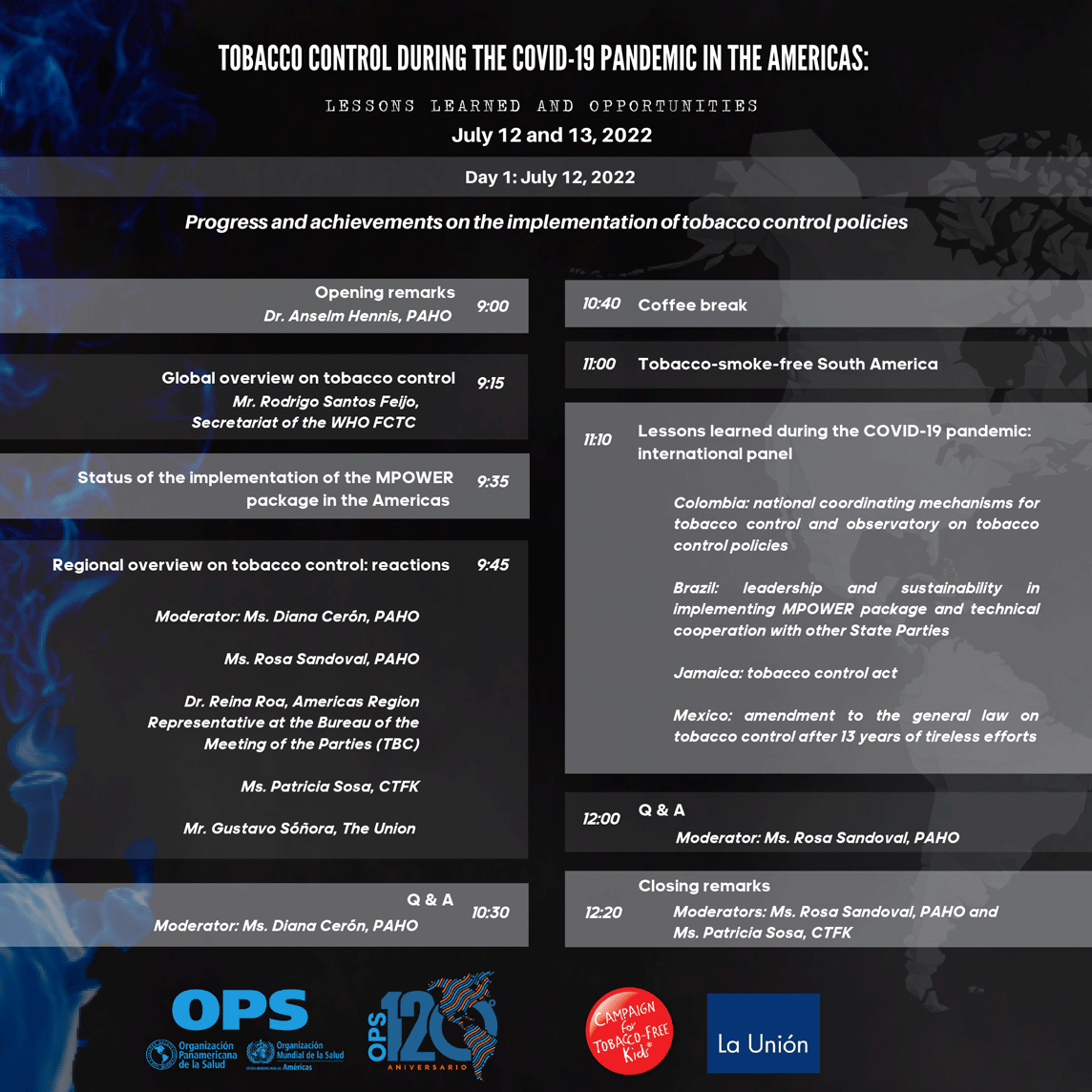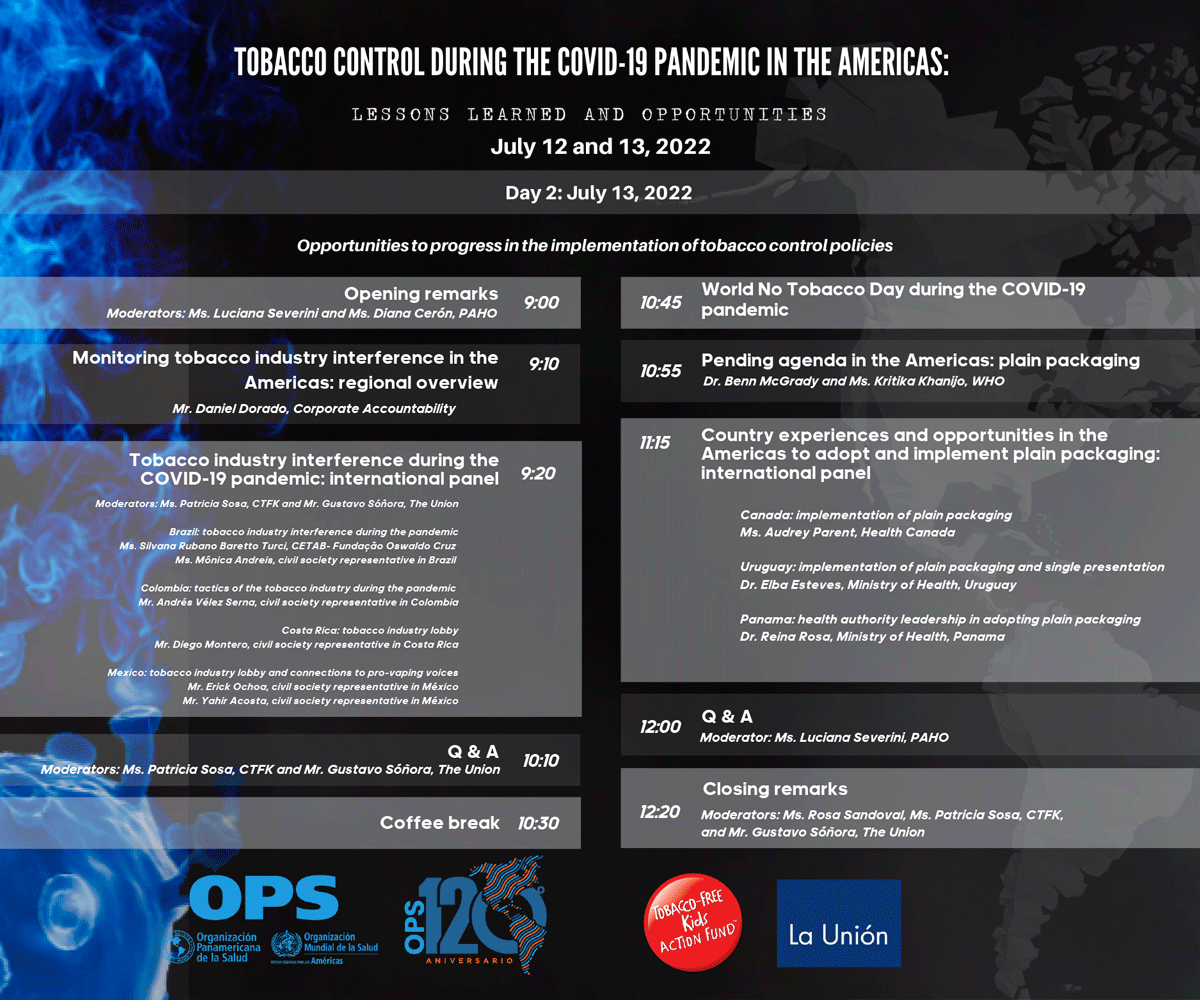The COVID-19 pandemic posed significant challenges for the tobacco control community, mainly because it was at the top of the political and legislative agendas of the countries in the region. However, this context also served to highlight the relevance of public health policies in the population and, among other things, showed how the consequences of these policies transcend the health sector. The purpose of this meeting was to discuss the achievements in tobacco control during the pandemic and to reflect on challenges still pending in the region.
Between early 2020 and 2022, we can identify examples in the region where progress with the adoption of tobacco control measures or discussions of proposals in legislative branches has been made. For instance, at the end of 2020, South America became the first sub-region to be 100% smoke-free, following legal measures adopted in Bolivia and Paraguay. By the end of 2021, Mexico adopted the same measure which resulted in 63% of the total population of the 35 Member States of the Pan American Health Organization (PAHO) to be covered by this public health policy. Mexico also adopted a total ban on all forms of advertising, promotion, and sponsorship of tobacco products, increasing the number of countries that apply this policy in the region to nine.
Other countries, such as Colombia (national coordination mechanism), Peru (periodic update of excise taxes), and Saint Lucia (100% smoke-free environments), were able to make significant progress in implementing the MPOWER package and other measures established in the WHO Framework Convention on Tobacco Control (WHO FCTC). Countries like Jamaica, with its comprehensive tobacco control act bill, and Costa Rica, with its bill on plain packaging, also moved forward with the parliamentary discussions of these tobacco control initiatives. Additionally, it is also important to highlight Brazil’s leadership and the stability of their obtained achievements. Brazil is the only PAHO Member State that implements the entire MPOWER package at the highest level, since 2018, demonstrating that sustainability of tobacco control policies over the years is possible even in times of crisis. Some questions that will be addressed during the meeting are: how was it possible to adopt/drive these tobacco control measures in such a particular context as the COVID-19 pandemic? What were the main challenges? What lessons were learned?
Unfortunately, the tobacco industry and its allies also managed to adapt to this context, taking advantage of the vulnerabilities and crisis scenarios faced by public health matters, to amplify their interference strategies and tactics. For this reason, this meeting also aims to warn about the main tactics and arguments used by the industry, which are cross-cutting to all tobacco control measures. Some of these tactics used during the COVID-19 pandemic included: approaching governments by offering donations of masks, respirators, funds to fight the virus, among other resources; trying to obtain special treatment or avoid existing regulations, such as attempting to continue production during quarantine despite a mandatory production shutdown; and seeking to destabilize governmental discussions on tobacco control, including advocating for flexible regulation of novel and emerging nicotine and tobacco products.
While progress has been significant and should be highlighted, we must not lose sight of the fact that 17 years have passed since the WHO FCTC came into force and 14 years since the launch of the MPOWER package. In addition, 2022 is the last year of the Strategy and Action Plan to Strengthen Tobacco Control in the Region of the Americas 2018-2022, and there is still room for improvement as new challenges lie ahead.
In particular, one of the least implemented measures in the region has been the adoption of plain packaging of tobacco products by only two Member States. During this meeting, emphasis will be placed on this measure, presenting the cases of countries in the region that have already implemented it or are on their way to doing so. Plain packaging is a significant measure to reduce the demand for tobacco products, related to articles 11 and 13 of the WHO FCTC as it reduces the attractiveness of tobacco products, restricts use of the pack as a form of advertising and promotion, limits misleading packaging and increases the effectiveness of health warnings.
In this context, the main objective of this meeting will be to provide a space for interaction so that PAHO Member States, the Pan American Sanitary Bureau, and representatives of civil society and academia can share achievements and challenges faced in tobacco control and jointly think about strategies for a post-pandemic context. This event is organized by the Pan American Health Organization in collaboration with the Campaign for Tobacco-Free Kids, the International Union Against Tuberculosis and Lung Disease, and thanks to the financial assistance of the Bloomberg Initiative to Reduce Tobacco Use.
-
Government delegates from each Party:
-
WHO FCTC or tobacco control focal point of the Ministry of Health, or representative of the National Coordinating Mechanism for tobacco control (if applicable),
-
Representative of the International Cooperation Department (or similar) of the Ministry of Health (preferably involved in country representation at international meetings related to tobacco control),
-
Representative from the Ministry of Foreign Affairs involved in monitoring of the WHO FCTC; and
-
Representative from any other Ministry/Government sector partner in WHO FCTC implementation in the country.
-
-
PAHO country office focal points for tobacco control.
-
Civil society organizations in official relations with PAHO.
-
Provide a global and regional overview on progress and achievements related to tobacco control during the COVID-19 pandemic.
-
Warn about tobacco industry tactics to interfere in political and legislative processes to hinder implementation of tobacco control measures.
-
Strengthen Member States' capacity building to progress implementation of MPOWER package measures, with emphasis on those with the least progress in the region.
-
Share experiences and lessons learned from countries in the region on the implementation of tobacco control policies during the COVID-19 pandemic.
-
Facilitate the collaboration between representatives of Member States and partners of the Bloomberg Initiative to Reduce Tobacco Use, to progress implementation of MPOWER package measures.
Day 1 - July 12, 2022
Day 2 - July 13, 2022
July 12 Presentations
July 13 Presentations
- WHO Framework Convention on Tobacco Control
- Protocol to Eliminate Illicit Trade in Tobacco Products
- Guidelines, and policy options and recommendations for implementation of the WHO FCTC
- WHO report on the global tobacco epidemic 2021: addressing new and emerging products
- WHO global report on trends in prevalence of tobacco use 2000–2025, 4th ed.
- Global Strategy to Accelerate Tobacco Control: Advancing Sustainable Development through the Implementation of the WHO FCTC 2019-2025
- Strategy and Plan of Action to Strengthen Tobacco Control in the Region of the Americas 2018-2022
- Indicator monitoring and evaluation tool. Strategy and Plan of Action to Strengthen Tobacco Control in the Region of the Americas 2018-2022
- Report on Tobacco Control for the Region of the Americas 2018
- Manual for Developing Tobacco Control Legislation in the Region of the Americas
- Avances en el control del tabaco en la Región de las Américas 2020 (only Spanish)
- Tobacco plain packaging: global status 2021 update
- Global Tobacco Industry Interference Index
- Índice de Interferencia Tabacalera - Reporte Regional 2021 (only Spanish)



